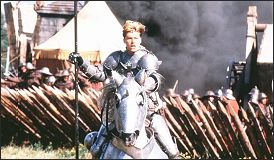![[Deep Focus]](../../flicker/logo.gif) |
|
|
THE MESSENGER: THE STORY OF JOAN OF ARC | |
 |
GRADE: C- | Not your mother's Joan of Arc movie. |
|
I guess that, sooner or later, someone had to reinvent Joan of Arc for the multiplex. Kathryn Bigelow (Strange Days) reportedly wanted the assignment, and planned to cast Claire Danes. It's hard to tell what that movie would have looked like, but it couldn't have been much more of a disappointment than what Luc Besson did with it. Don't get me wrong -- I tend to appreciate Besson's naive, unashamedly romantic worldview, an artsy European sensibility gone thoroughly Hollywood. His 1994 Leon is exciting and absurdly moving, thanks mainly to the interplay between Jean Reno and a young Natalie Portman, and 1997's The Fifth Element is a goofy paean to love, L-U-V, that's even more of a hoot on repeated viewings. But his Joan of Arc is a mess, despite some stirring battle scenes and the mostly knockout presence of a close-cropped Milla Jovovich as the maiden herself. Jovovich, Besson's own personal muse through the making of his last two films (though they've since separated), is magnetic and energetic enough to play a credible Joan (as long as you believe Joan was not just a warrior, but also a fabulous, supermodel-level babe). And Besson remains a servicable action film director, though not an especially facile one. Leading her army against the seemingly impenetrable fortresses of the English, Joan's struggle against great odds is undeniably stirring, and Besson helps you understand how the French could believe, fervently, that God is on her side. Besson's big mistake, I think, is trying to dramatize the interior life of his subject. Yes, Joan had visions -- but I guarantee that whatever image a sympathetic audience conjures in its collective mind will be more compelling than the blue-eyed Christ figure on display in Besson's hallucinatory dream sequences. The whole conceit turns into a disaster right about the time Dustin Hoffman (billed as "The Conscience") shows up, spouting platitudes and sending poor Milla running around her cell, babbling like Ally McBeal. That's kind of a shame, since she does quite well up to that point, charging into battle with a banshee wail that suggests the eruption of a sublimated bloodthirstiness. That darkly attractive aspect of her character -- that she's as likely a charismatic madwoman as the vessel of the lord -- is more or less betrayed by the final reels, in which The Conscience browbeats her over the killing she's overseen and Joan starts to look like little more than a very confused young lady who's about to take a fall. As the story winds down, with Joan condemned to a horrible death by fire, Besson is aiming for tragedy and psychological significance. Trouble is, he's chosen a lurid, often jokey tone for the balance of the picture -- including some blithe cgi bloodshed in the battle scenes -- and it's impossible to shake the feeling that this particular vision of the middle ages is, to a great extent, nothing more than a put-on. This glib, pre-fab version of such a great story makes me all the more grateful for Dreyer's The Passion of Joan of Arc (1928), a film whose dialogue is drawn from the actual transcripts of Joan's trial, and which stands as one of the most harrowing experiences in all of cinema. Compared to that film, The Messenger plays as a crime against history.
| |
|
Directed by Luc Besson Written by Besson and Andrew Birkin Cinematography by Thierry Arbogast Music by Eric Serra Starring Milla Jovovich France/USA, 1999 Theatrical aspect ratio: 2.35:1
| |

| |
 http://www.deep-focus.com/flicker/
bryant@deep-focus.com
http://www.deep-focus.com/flicker/
bryant@deep-focus.com